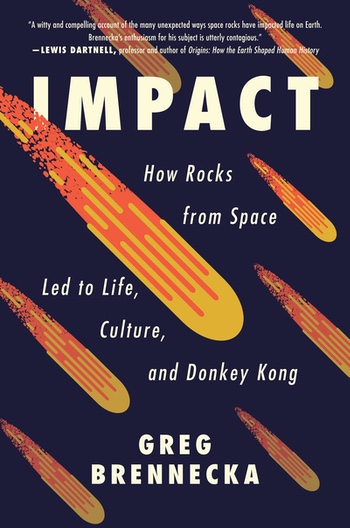 |
Review: Impact
by Jeff Foust
Monday, March 7, 2022
Impact: How Rocks from Space Led to Life, Culture, and Donkey Kong
by Greg Brennecka
William Morrow, 2022
hardcover, 304 pp., illus.
ISBN 978-0-06-307892-5
US$28.99
The threat posed by asteroids to the Earth has gotten plenty of attention in recent years, possibly to the point of being overhyped: harmless flybys of asteroids a few million kilometers from the Earth now become fodder for clickbait articles in tabloids. Yet space rocks—tiny ones—hit the Earth every day. Rather that pose a threat to humanity, these meteorites provide a wealth of knowledge about the solar system to scientists, and occasionally wealth to the meteorite hunters who find, buy, and sell them.
Meteorites are the focus of Impact by Greg Brennecka, a cosmochemist at Lawrence Livermore and one of small group of scientists who devote their research to the study of meteorites. The book is a serious examination of the history and science of meteorites for general audiences, but one that doesn’t take itself too seriously.
| “I like to think of the study of meteorites as ‘cosmic forensics,’” he writes. “Meteorites were witnesses to a crime (formation of the Solar System), and people that study meteorites interrogate them to give up their information.” |
The book starts with the early history of the solar system and various impacts, from the protoplanet whose collision with the Earth formed the Moon to the demise of the dinosaurs about 65 million years ago. As the book moves forward, it shifts from science to history, recounting various actual or suspected meteorite impacts in recorded history. The final chapters shift back to science, examining the role meteorites played in providing the building blocks of life on the early Earth as well as being a “free sample return” from Mars.
The book is meant for general audiences but there are still many insights even for more knowledgeable audiences. One is that, for millennia, most in the West did not consider meteorites as rocks falling from space, even when they saw them fall from the sky. Brennecka blames that on Aristotle, who described them as rocks lifted up by winds or “a combination of various exhalations of Earth” that condensed under the right conditions into those falling rocks. And for those who want more details about the science of meteorites, a pair of appendices discusses the classification of those objects as well as the instrumentation used to study them.
Brennecka keeps the material from getting too dense with humor: lot of it, in asides peppered throughout the text. Indeed, at times it can be a little too much, or at least him trying a little too hard. This extends to cartoonish illustrations in the book, with text in Comic Sans font.
“I like to think of the study of meteorites as ‘cosmic forensics,’” he writes early in the book. “Meteorites were witnesses to a crime (formation of the Solar System), and people that study meteorites interrogate them to give up their information.” That information addresses some of key questions, from the formation of the solar system to the development of life. Serious questions, to be certain, but there’s no reason you can’t have a little fun trying to answer them.
Note: we are using a new commenting system, which may require you to create a new account.
No comments:
Post a Comment